Charles E W Bean, Diaries, AWM38 3DRL 606/256/1 - 1915 - 1936 - Part 8
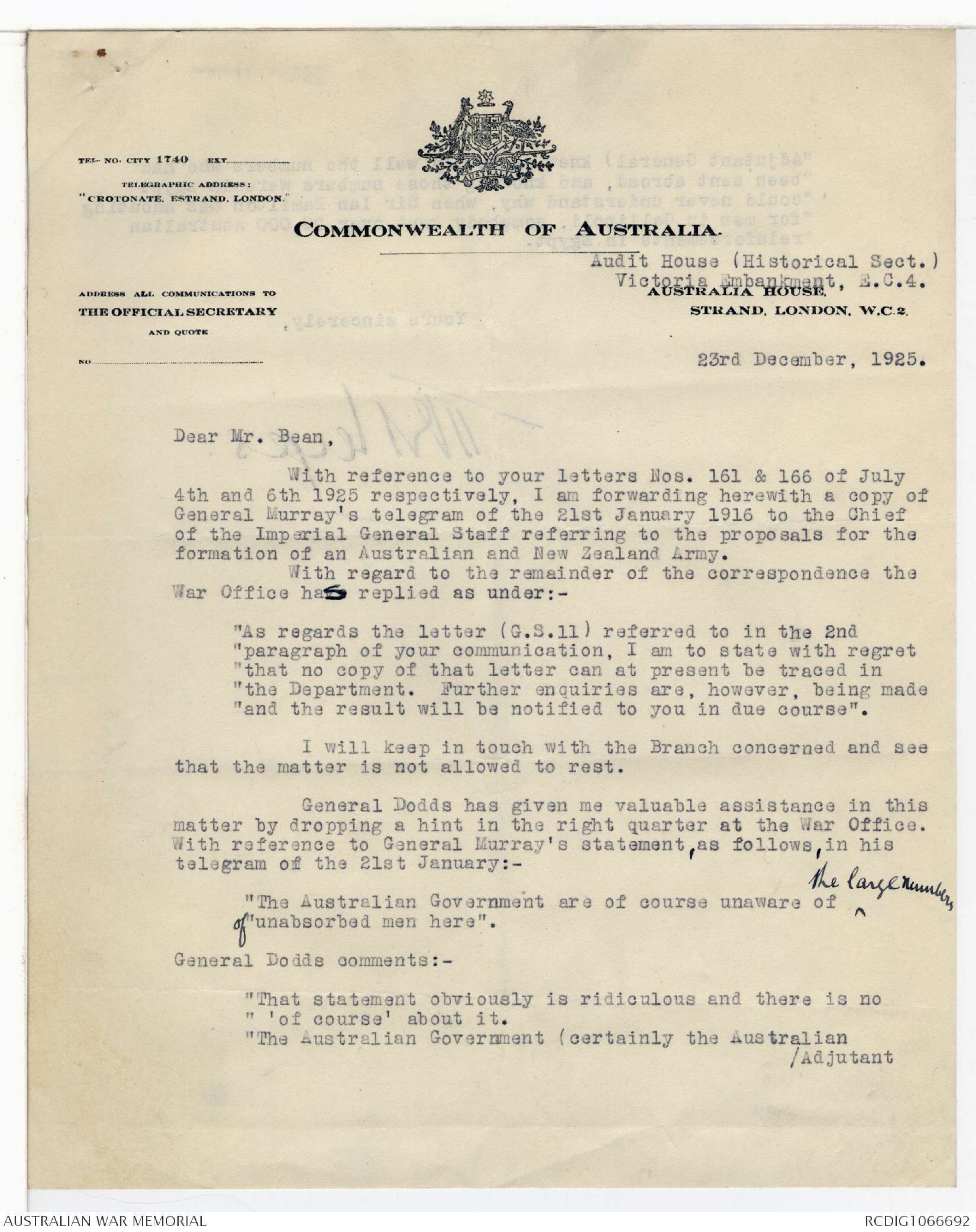
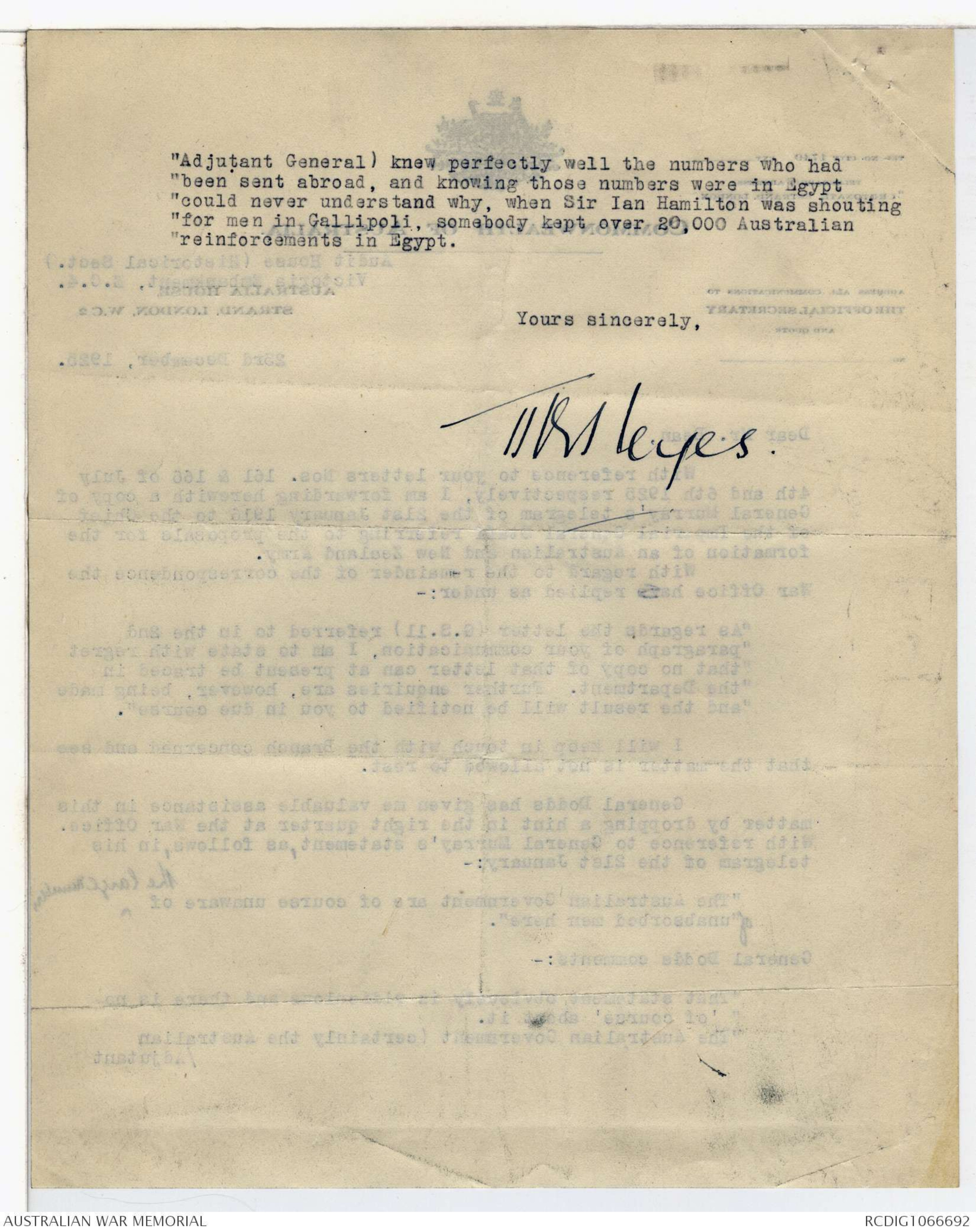
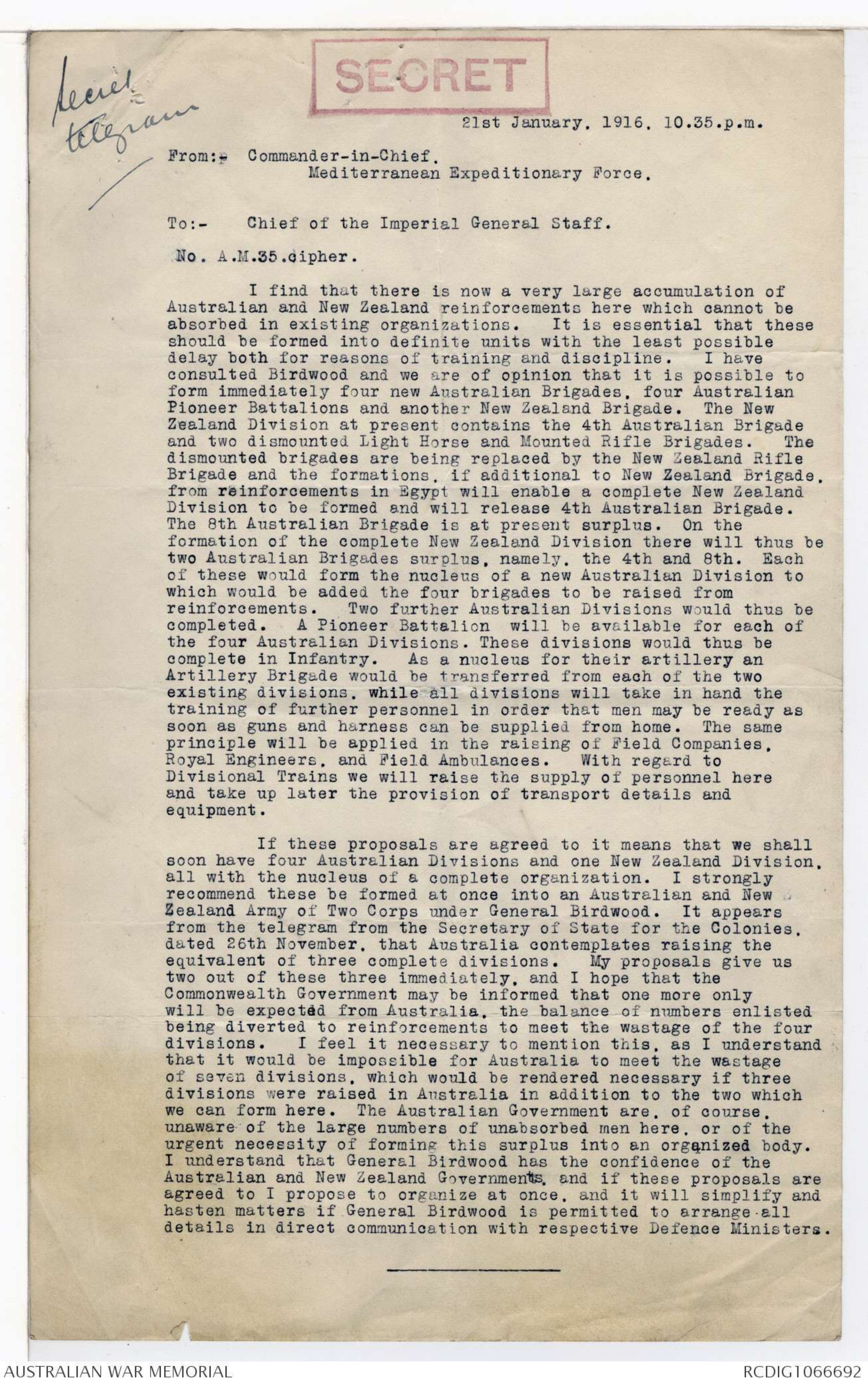
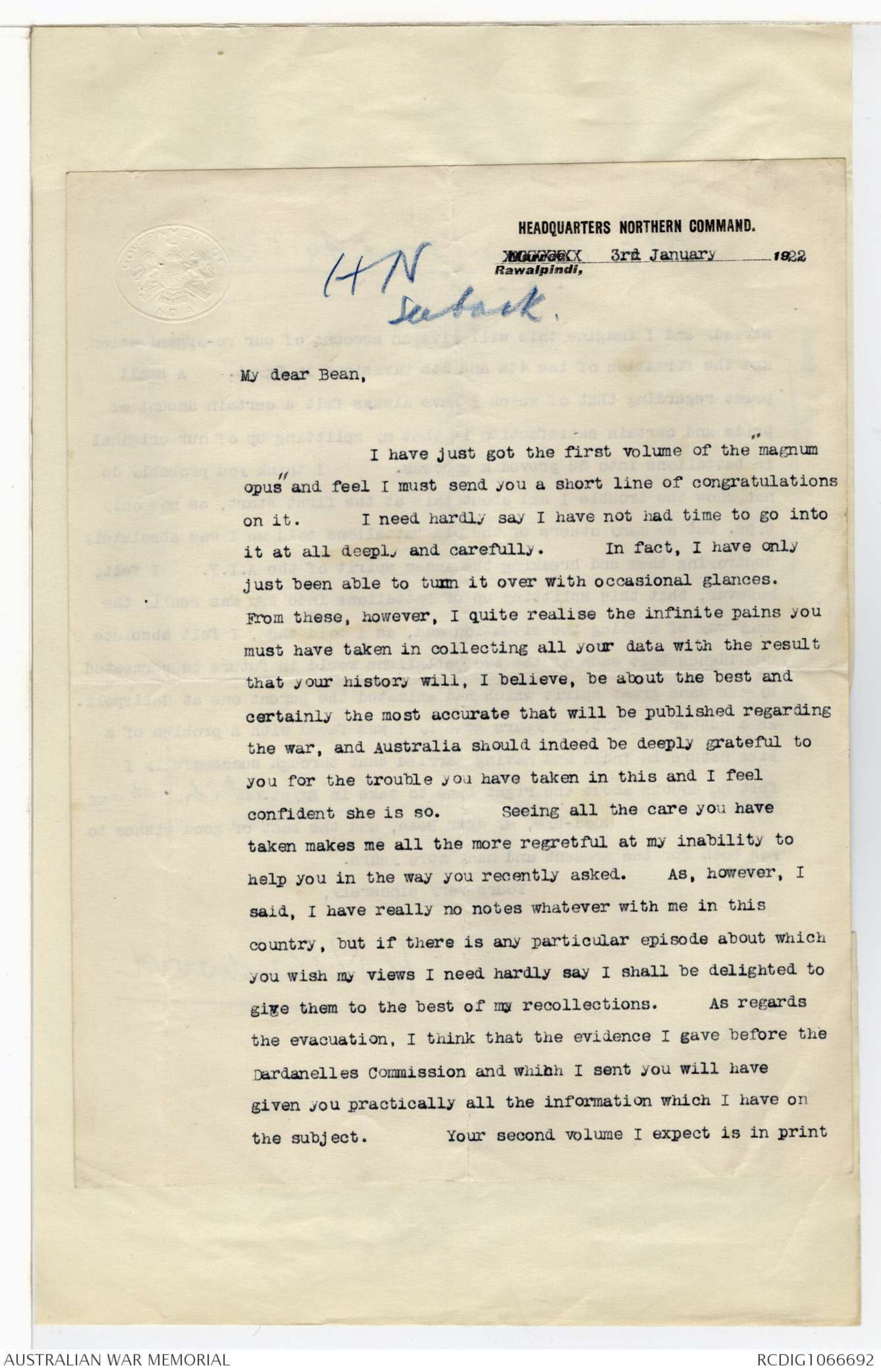
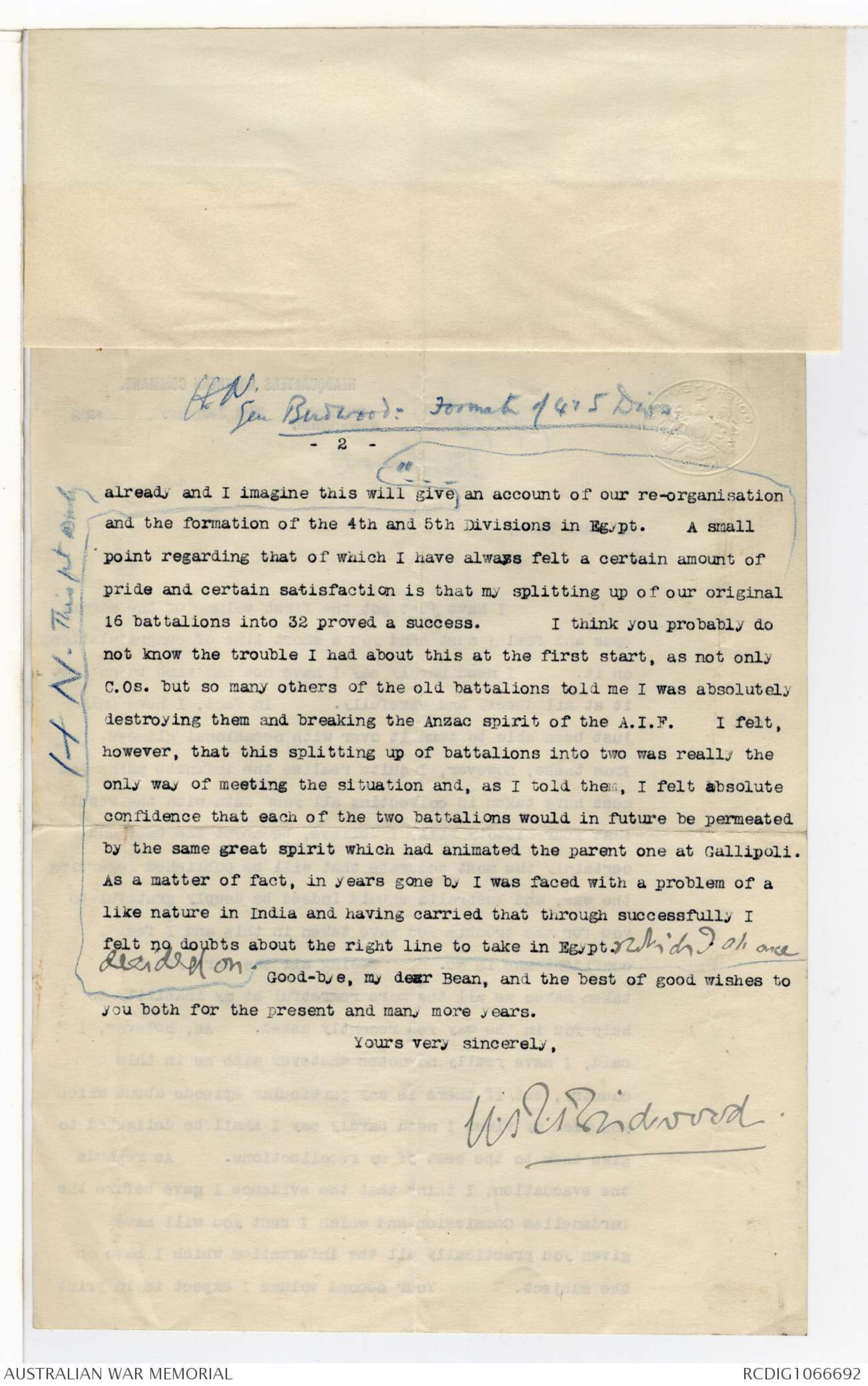
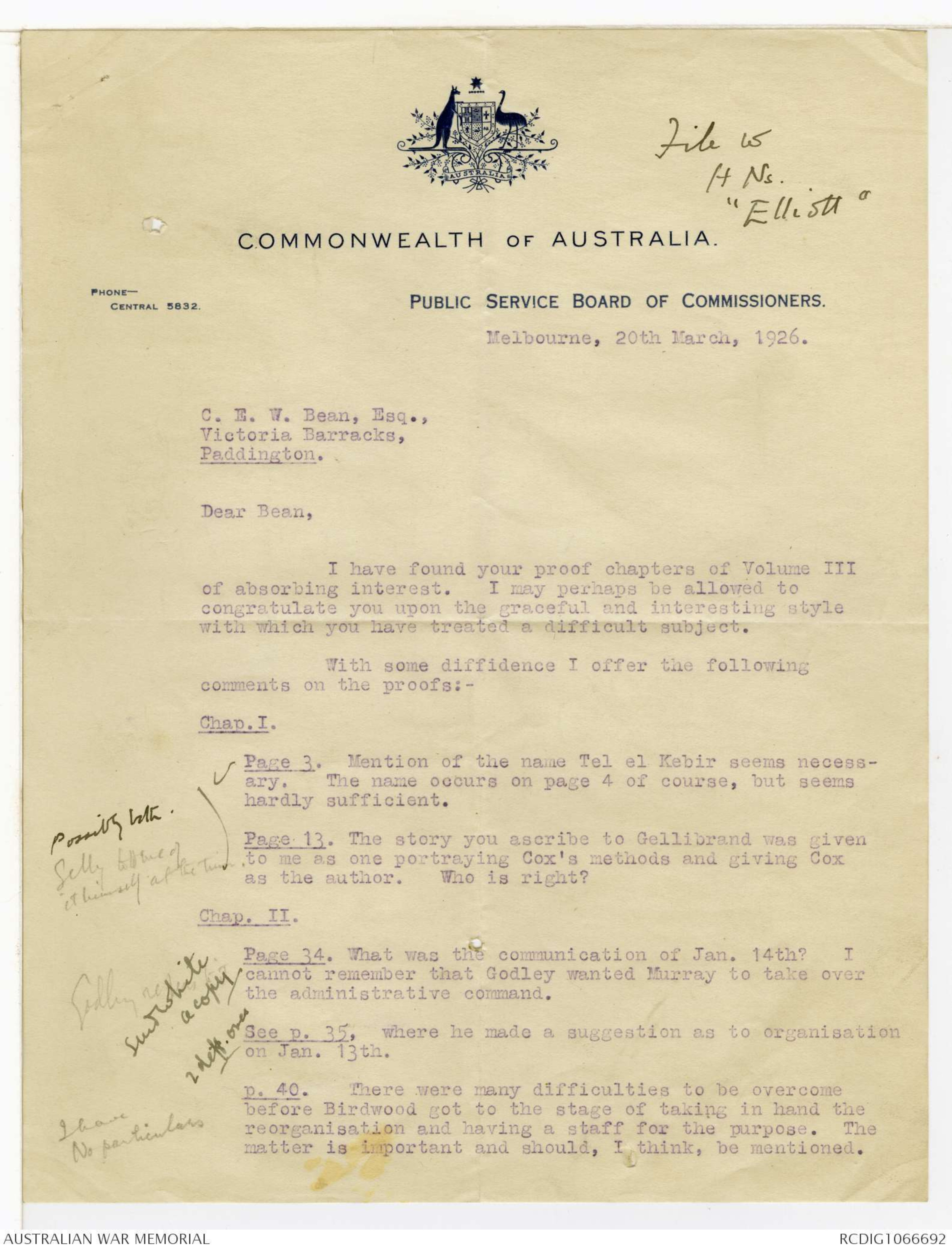
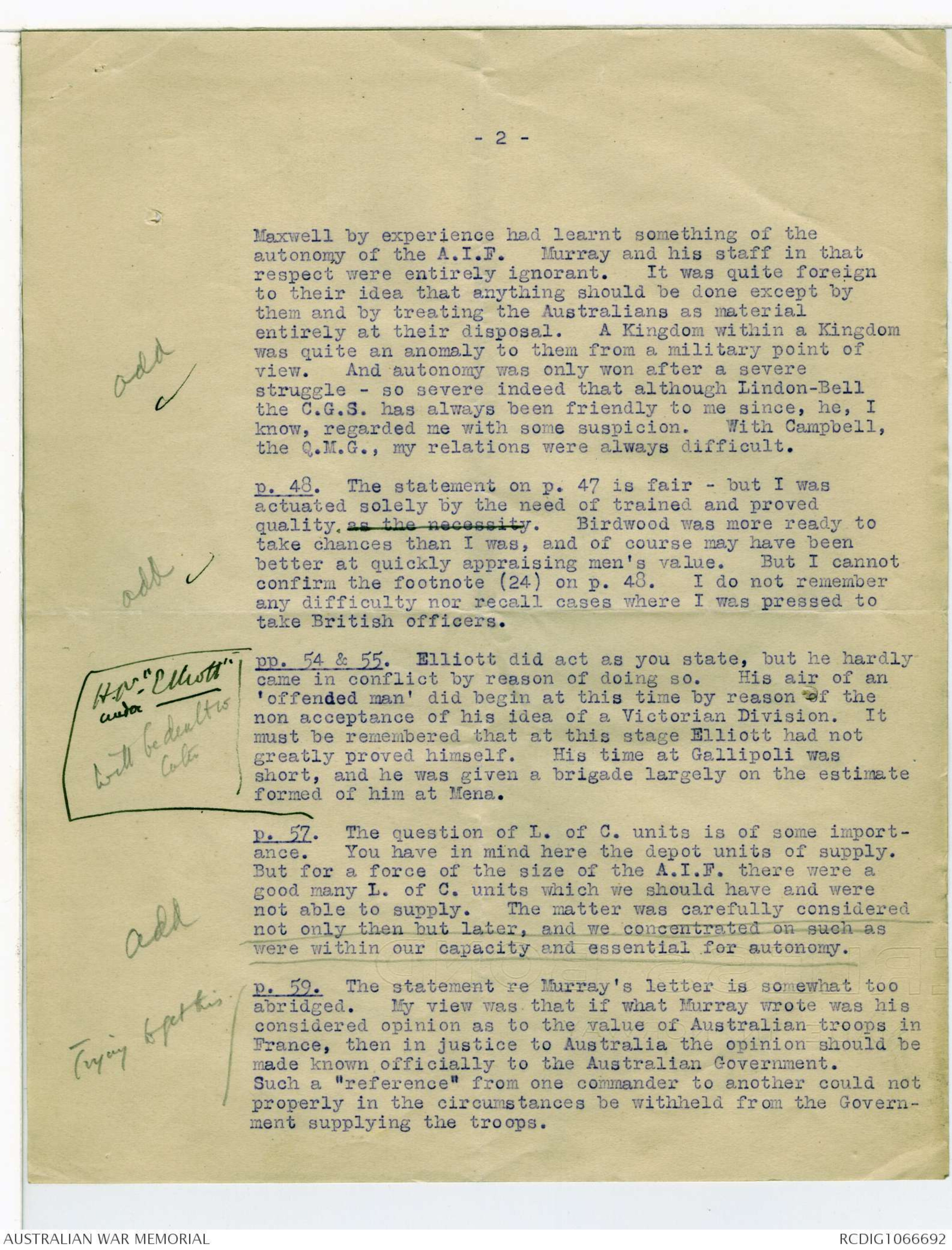
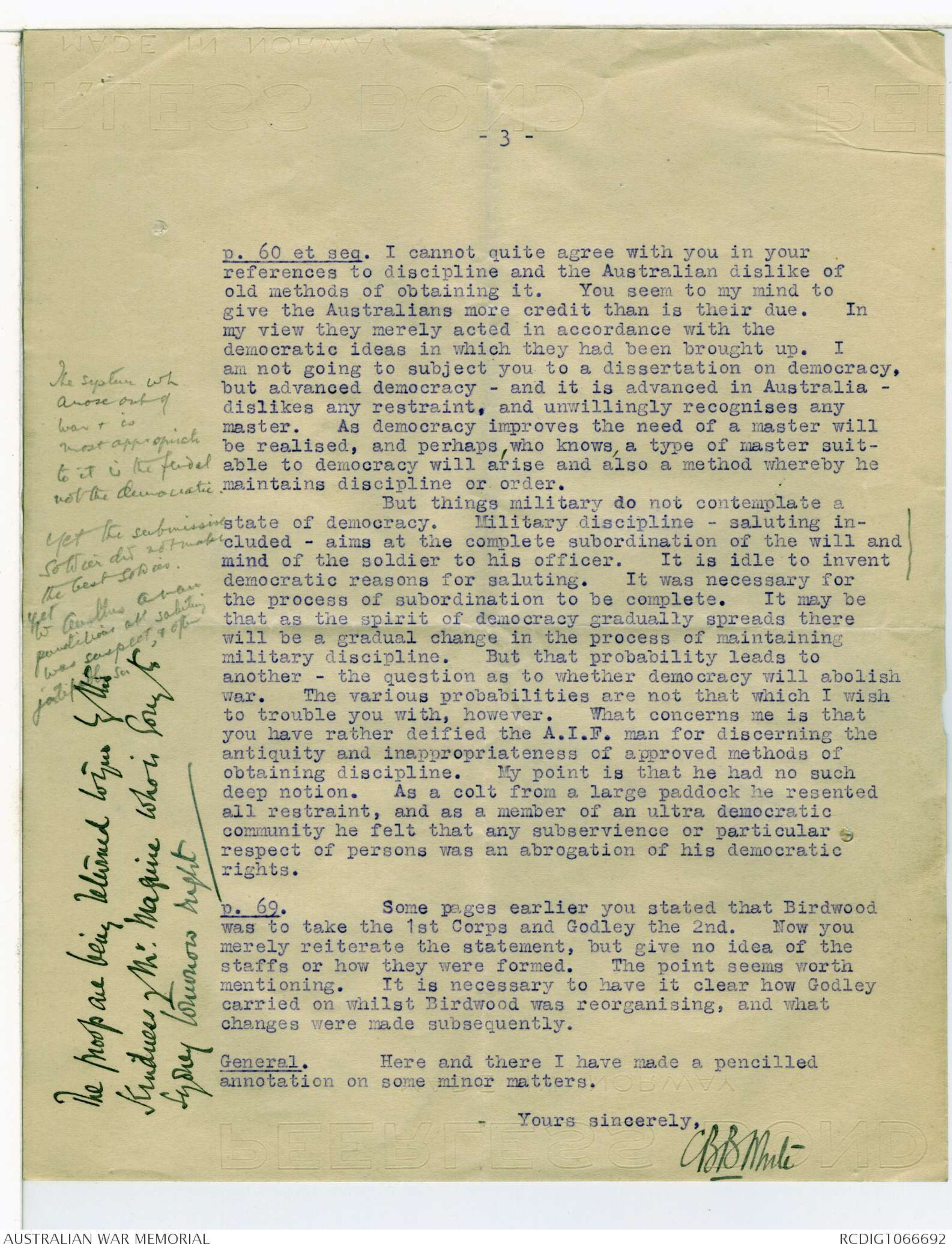
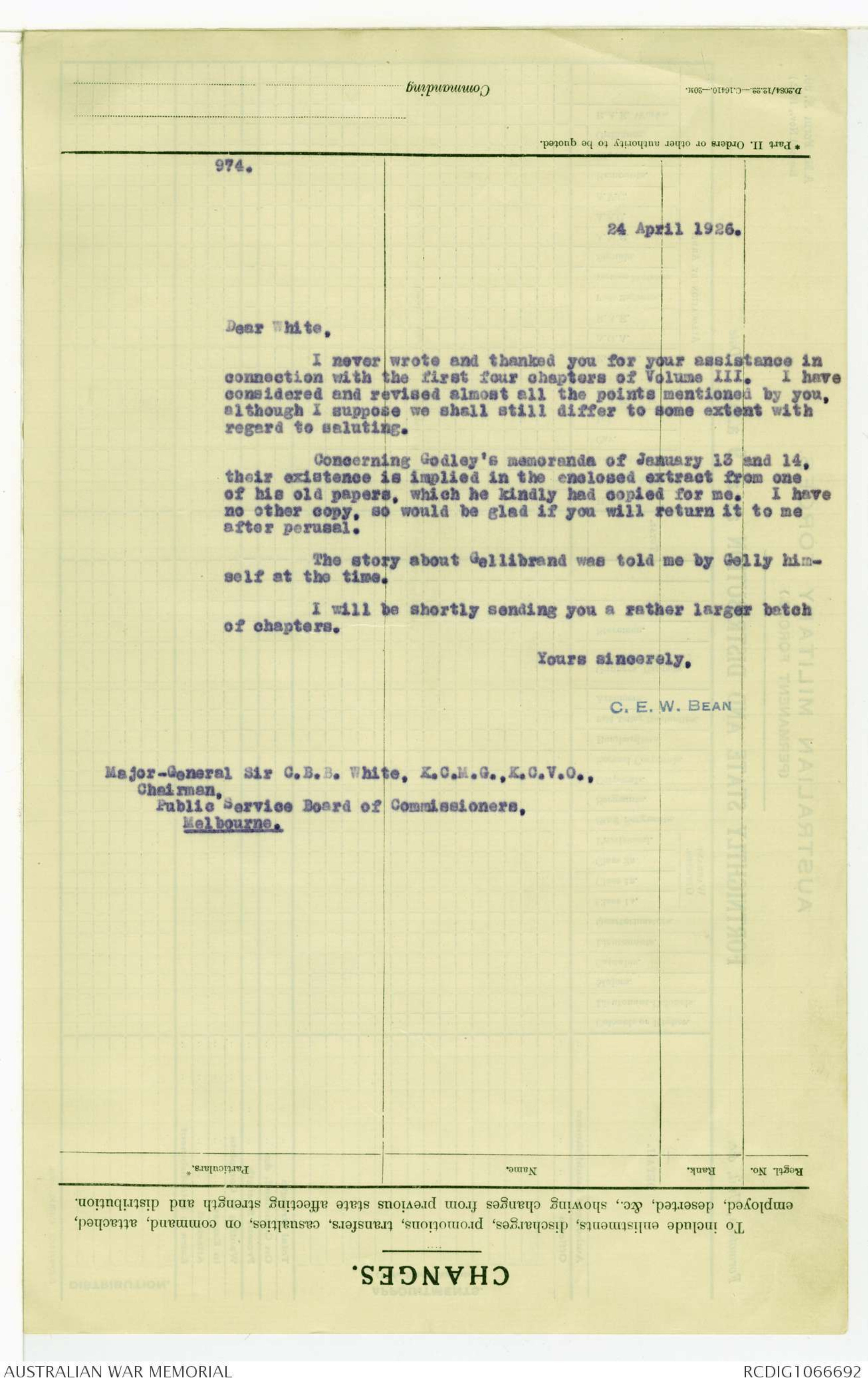
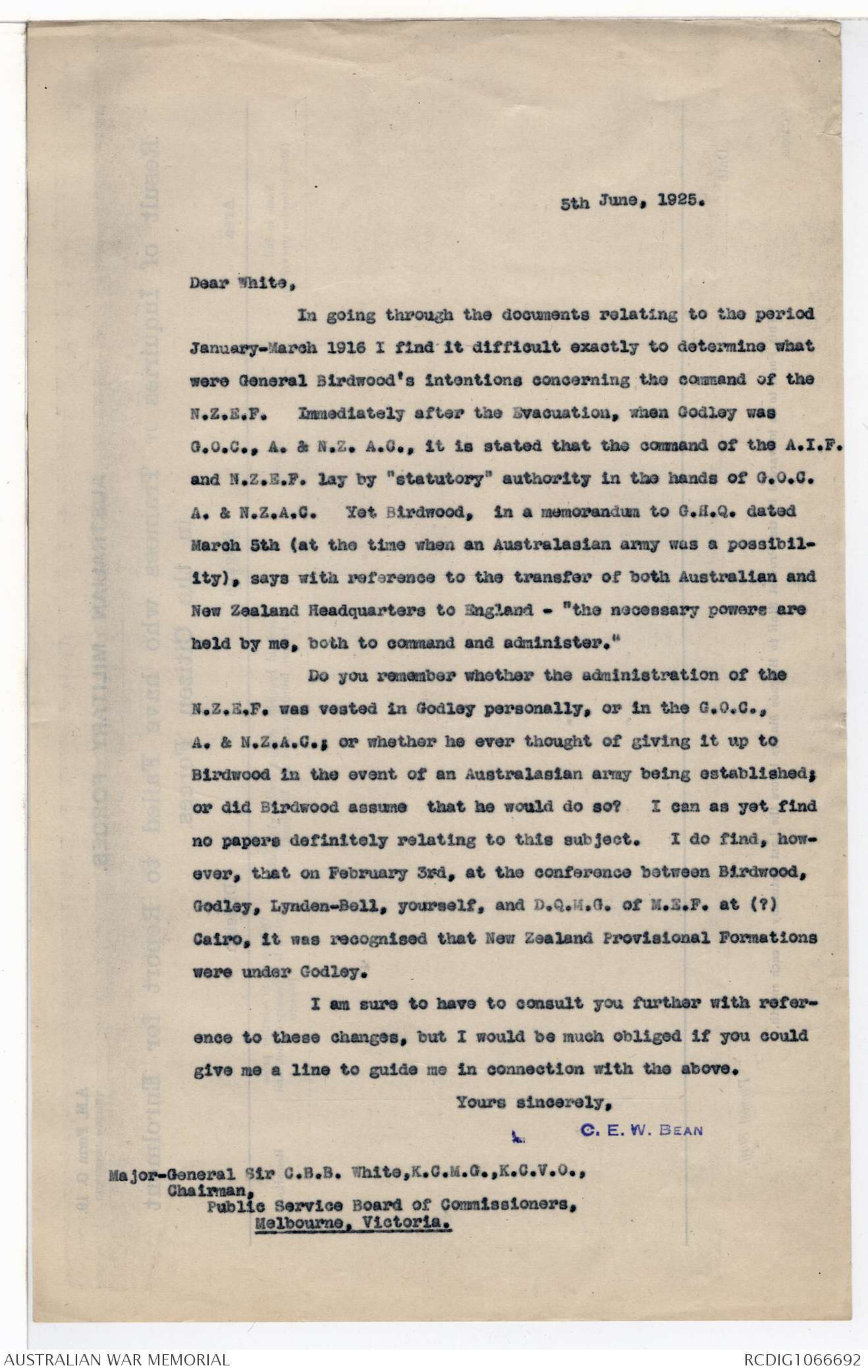
TEL. NO. CITY 1740 EXT.........................
TELEGRAPHIC ADDRESS:
"CROTONATE. ESTRAND. LONDON.
ADDRESS ALL COMMUNICATIONS TO
THE OFFICIAL SECRETARY
AND QUOTE
NO.....................
COMMONWEALTH OF AUSTRALIA.
Audit House (Historical Sect.)
Victoria Embankment, E.C.4.
AUSTRALIA HOUSE,
STRAND, LONDON. W.C.2.
23rd December, 1925.
Dear Mr. Bean.
With reference to your letters Nos. 161 & 166 of July
4th and 6th 1925 respectively, I am forwarding herewith a copy of
General Murray's telegram of the 21st January 1916 to the Chief
of the Imperial General Staff referring to the proposals for the
formation of an Australian and New Zealand Army.
With regard to the remainder of the correspondence the
War Office has replied as under:-
"As regards the letter (G.S.11) referred to in the 2nd
"paragraph of your communication, I am to state with regret
"that no copy of that letter can at present be traced in
"the Department. Further enquiries are, however, being made
"and the result will be notified to you in due course".
I will keep in touch with the Branch concerned and see
that the matter is not allowed to rest.
General Dodds has given me valuable assistance in this
matter by dropping a hint in the right quarter at the War Office.
With reference to General Murray's statement, as follows, in his
telegram of the 21st January:-
"The Australian Government are of course unaware of the large numbers
of "unabsorbed men here".
General Dodds comments:-
"That statement obviously is ridiculous and there is no
" 'of course' about it.
"The Australian Government (certainly the Australian
/Adjutant
"Adjutant General) knew perfectly well the numbers who had
"been sent abroad, and knowing those numbers were in Egypt
"could never understand why, when Sir Ian Hamilton was shouting
"for men in Gallipoli, somebody kept over 20,000 Australian
"reinforcements in Egypt.
Yours sincerely,
T S Heyes
Secret
[*Receid
telegram*]
21st January. 1916. 10.35.p.m.
From:- Commander-in-Chief.
Mediterranean Expeditionary Force.
To:- Chief of the Imperial General Staff.
No. A.M.35.cipher.
I find that there is now a very large accumulation of
Australian and New Zealand reinforcements here which cannot be
absorbed in existing organizations. It is essential that these
should be formed into definite units with the least possible
delay both for reasons of training and discipline.
I have consulted Birdwood and we are of opinion that it is possible to
form immediately four new Australian Brigades. four Australian
Pioneer Battalions and another New Zealand Brigade. The New
Zealand Division at present contains the 4th Australian Brigade
and two dismounted Light Horse and Mounted Rifle Brigades.
The dismounted brigades are being replaced by the New Zealand Rifle
Brigade and the formations. if additional to New Zealand Brigade.
from reinforcements in Egypt will enable a complete New Zealand
Division to be formed and will release 4th Australian Brigade.
The 8th Australian Brigade is at present surplus. On the
formation of the complete New Zealand Division there will thus be
two Australian Brigades surplus. namely. the 4th and 8th. Each
of these would form the nucleus of a new Australian Division to
which would be added the four brigades to be raised from
reinforcements. Two further Australian Divisions would thus be
completed. A Pioneer Battalion will be available for each of
the four Australian Divisions. These divisions would thus be
complete in Infantry. As a nucleus for their artillery an
Artillery Brigade would be transferred from each of the two
existing divisions. while all divisions will take in hand the
training of further personnel in order that men may be ready as
soon as guns and harness can be supplied from home. The same
principle will be applied in the raising of Field Companies.
Royal Engineers. and Field Ambulances. With regard to
Divisional Trains we will raise the supply of personnel here
and take up later the provision of transport details and
equipment.
If these proposals are agreed to it means that we shall
soon have four Australian Divisions and one New Zealand Division.
all with the nucleus of a complete organization. I strongly
recommend these be formed at once into an Australian and New
Zealand Army of Two Corps under General Birdwood. It appears
from the telegram from the Secretary of State for the Colonies.
dated 26th November. that Australia contemplates raising the
equivalent of three complete divisions. My proposals give us
two out of these three immediately. and I hope that the
Commonwealth Government may be informed that one more only
will be expected from Australia. the balance of numbers enlisted
being diverted to reinforcements to meet the wastage of the four
divisions. I feel it necessary to mention this, as I understand
that it would be impossible for Australia to meet the wastage
of seven divisions. which would be rendered necessary if three
divisions were raised in Australia in addition to the two which
we can form here. The Australian Government are. of course.
unaware of the large numbers of unabsorbed men here. or of the
urgent necessity of forming this surplus into an organized body.
I understand that General Birdwood has the confidence of the
Australian and New Zealand Governments. and if these proposals are
agreed to I propose to organize at once. and it will simplify and
hasten matters if General Birdwood is permitted to arrange all
details in direct communication with respective Defence Ministers.
[*HN
see back*]
HEADQUARTERS NORTHERN COMMANDxxxxx Rawalpindi,
3rd January 1922
My dear Bean,
I have just got the first volume of the "magnum
opus" and feel I must send you a short line of congratulations
on it. I need hardly say I have not had time to go into
In fact, I have only it at all deeply and carefully.
just been able to turn it over with occasional glances.
From these, however, I quite realise the infinite pains you
must have taken in collecting all your data with the result
that your history will, I believe, be about the best and
certainly the most accurate that will be published regarding
the war, and Australia should indeed be deeply grateful to
you for the trouble you have taken in this and I feel
confident she is so. Seeing all the care you have
taken makes me all the more regretful at my inability to
help you in the way you recently asked. As, however,
said, I have really no notes whatever with me in this
country, but if there is any particular episode about which
you wish my views I need hardly say I shall be delighted to
give them to the best of my recollections. As regards
the evacuation, I think that the evidence I gave before the
Dardanelles Commission and which I sent you will have
given you practically all the information which I have on
the subject. Your second volume I expect is in print
[*HN.
Gen Birdwood: Formtn of 4& 5 Divs*]
- 2 -
already and I imagine this will give^[*HN. This put only*] an account of our re-rganisation
and the formation of the 4th and 5th Divisions in Egypt. A small
point regarding that of which I have always felt a certain amount of
pride and certain satisfaction is that my splitting up of our original
16 battalions into 32 proved a success. I think you probably do
not know the trouble I had about this at the first start, as not only
C.Os. but so many others of the old battalions told me I was absolutely
destroying them and breaking the Anzac spirit of the A.I.F. I felt,
however, that this splitting up of battalions into two was really the
only way of meeting the situation and, as I told them, I felt absolute
confidence that each of the two battalions would in future be permeated
by the same great spirit which had animated the parent one at Gallipoli.
As a matter of fact, in years gone by I was faced with a problem of a
like nature in India and having carried that through successfully I
felt no doubts about the right line to take in Egypt which I at once decided on.
Good-bye, my dear Bean, and the best of good wishes to
you both for the present and many more years.
Yours very sincerely,
W. R. Birdwood
[*File w
H Ns.
"Elliott"*]
Phone Central 5832
COMMONWEALTH OF AUSTRALIA.
PUBLIC SERVICE BOARD OF COMMISSIONERS.
Melbourne, 20th March, 1926.
C. E. W. Bean, Esq.,
Victoria Barracks,
Paddington.
Dear Bean,
I have found your proof chapters of Volume III
of absorbing interest. I may perhaps be allowed to
congratulate you upon the graceful and interesting style
with which you have treated a difficult subject.
With some diffidence I offer the following
comments on the proofs:-
Chap.I.
√ Page 3. Mention of the name Tel el Kebir seems necessary.
The name occurs on page 4 of course, but seems
hardly sufficient.
Page. 13. The story you ascribe to Gellibrand was given
to me as one portraying Cox's methods and giving Cox
as the author. Who is right?
[*Possibly both
Gelly told me of
it himself at the time*]
Chap. II.
[*Godley [[?]]
sent White
a copy*]
Page 34. What was the communication of Jan. 14th? I
cannot remember that Godley wanted Murray to take over
the administrative command.
[*2 deff. ones*]
See p. 35, where he made a suggestion as to organisation
on Jan. 13th.
p. 40. There were many difficulties to be overcome
before Birdwood got to the stage of taking in hand the
reorganisation and having a staff for the purpose. The
matter is important and should, I think, be mentioned.
[*have
no particulars*]
- 2 -
Maxwell by experience had learnt something of the
autonomy of the A.I.F. Murray and his staff in that
respect were entirely ignorant. It was quite foreign
to their idea that anything should be done except by
them and by treating the Australians as material
entirely at their disposal. A Kingdom within a Kingdom
[*add √*]
was quite an anomaly to them from a military point of
view. And autonomy was only won after a severe
struggle - so severe indeed that although Lindon-Bell
the C.G.S. has always been friendly to me since, he, I
know, regarded me with some suspicion. With Campbell,
the Q.M.G., my relations were always difficult.
p. 48. The statement on p. 47 is fair - but I was
actuated solely by the need of trained and proved
quality, as the necessity. Birdwood was more ready to
take chances than I was, and of course may have been
[*add √*]
better at quickly appraising men's value. But I cannot
confirm the footnote (24) on p. 48. I do not remember
any difficulty nor recall cases where I was pressed to
take British officers.
pp. 54 & 55. Elliott did act as you state, but he hardly
came in conflict by reason of doing so. His air of an
'offended man' did begin at this time by reason of the
non acceptance of his idea of a Victorian Division. It
must be remembered that at this stage Elliott had not
greatly proved himself. His time at Gallipoli was
short, and he was given a brigade largely on the estimate
formed of him at Mena.
[*H.N - “Elliot”
writer
will be dealt w
later*]
p. 57. The question of L. of C. units is of some importance.
You have in mind here the depot units of supply.
But for a force of the size of the A.I.F. there were a
good many L. of C. units which we should have and were
not able to supply. The matter was carefully considered
[*add*]
not only then but later, and we concentrated on-such as
were within our capacity and essential for autonomy.
p. 59. The statement re Murray's letter is somewhat too
abridged. My view was that if what Murray wrote was his
considered opinion as to the value of Australian-troops in
France, then in justice to Australia the opinion should be
made known officially to the Australian Government.
Such a "reference" from one commander to another could not
properly in the circumstances be withheld from the Government supplying the troops.
[*Trying to get this*]
- 3 -
p. 60 et seq. I cannot quite agree with you in your
references to discipline and the Australian dislike of
old methods of obtaining it. You seem to my mind to
give the Australians more credit than is their due. In
my view they merely acted in accordance with the
democratic ideas in which they had been brought up. I
am not going to subject you to a dissertation on democracy,
but advanced democracy - and it is advanced in Australia -
dislikes any restraint, and unwillingly recognises any
master. As democracy improves the need of a master will
be realised, and perhaps, who knows, a type of master suitable
to democracy will arise and also a method whereby he
maintains discipline or order.
But things military do not contemplate a
state of democracy. Military discipline - saluting included -
aims at the complete subordination of the will and
mind of the soldier to his officer. It is idle to invent
democratic reasons for saluting. It was necessary for
the process of subordination to be complete. It may be
that as the spirit of democracy gradually spreads there
will be a gradual change in the process of maintaining
military discipline. But that probability leads to
another - the question as to whether democracy will abolish
war. The various probabilities are not that which I wish
to trouble you with, however. What concerns me is that
you have rather deified the A.I.F. man for discerning the
antiquity and inappropriateness of approved methods of
obtaining discipline. My point is that he had no such
deep notion. As a colt from a large paddock he resented
all restraint, and as a member of an ultra democratic
community he felt that any subservience or particular &
respect of persons was an abrogation of his democratic
rights.
D. 69. Some pages earlier you stated that Birdwood
was to take the 1st Corps and Godley the 2nd. Now you
merely reiterate the statement, but give no idea of the
staffs or how they were formed. The point seems worth
mentioning. It is necessary to have it clear how Godley
carried on whilst Birdwood was reorganising, and what
changes were made subsequently.
General.
Here and there I have made a pencilled
annotation on some minor matters.
Yours sincerely
CBB White
[*The system wh
arose out of
war & is
most appropriate
to it is the feudal
not the democractic.
Yet the submissive
soldier did not make
the best soldier.
Yet
Austlns a man
punctilious abt saluting
was suspect, & often
justifiably so.*]
[*The Troop are being returned to you
by this kindness Mr Maguire who is going to
Sydney tomorrow night.*]
974.
24 April 1926.
Dear White,
I never wrote and thanked you for your assistance in
connection with the first four chapters of Volume III. I have
considered and revised almost all the points mentioned by you,
although I suppose we shall still differ to some extent with
regard to saluting.
Concerning Godley's memoranda of January 13 and 14,
their existence is implied in the enclosed extract from one
of his old papers, which he kindly had copied for me. I have
no other copy, so would be glad if you will return it to me
after perusal.
The story about Gellibrand was told me by Gelly himself
at the time.
I will be shortly sending you a rather larger batch
of chapters.
Yours sincerely,
C.E.W. BEAN
Major-General Sir C.B.B. White,K.C.M.G.,K.C.V.O.,
Chairman
Public Service Board of Commissioners,
Melbourne.
5th June, 1925.
Dear White,
In going through the documents relating to tho period
January-March 1916 I find it difficult exactly to determine what
were General Birdwood's intentions concerning the command of the
N.Z.E.F. Immediately after the Evacuation, when Godley was
G.O.C., A. & N.Z. A.C., it is stated that the command of the A.I.F.
and N.Z.E.F. lay by "statutory" authority in the hands of G.O.C.
A. & N.Z.A.C. Yet Birdwood, in a memorandum to G.H.Q. dated
March 5th (at the time when an Australasian army was a possibility),
says with reference to the transfer of both Australian and
New Zealand Headquarters to England - "the necessary powers are
held by me, both to command and administer."
Do you remember whether the administration of the
N.Z.E.F. was vested in Godley personally, or in the G.O.C.,
A. & N.Z.A.C.; or whether he ever thought of giving it up to
Birdwood in the event of an Australasian army being established;
or did Birdwood assume that he would do so? I can as yet find
no papers definitely relating to this subject. I do find, however,
that on February 3rd, at the conference between Birdwood,
Godley, Lynden-Bell, yourself, and D.Q.M.G. of M.E.F. at (?)
Cairo, it was recognised that New Zealand Provisional Formations
were under Godley.
I am sure to have to consult you further with reference
to these changes, but I would be much obliged if you could
give me a line to guide me in connection with the above.
Yours sincerely,
C. E. W. BEAN
Major-General Sir C.B.B. White,K.C.M.G.,K.C.V.O.,
Chairman,
Public Service Board of Commissioners,
Melbourne, Victoria.
 Deb Parkinson
Deb ParkinsonThis transcription item is now locked to you for editing. To release the lock either Save your changes or Cancel.
This lock will be automatically released after 60 minutes of inactivity.